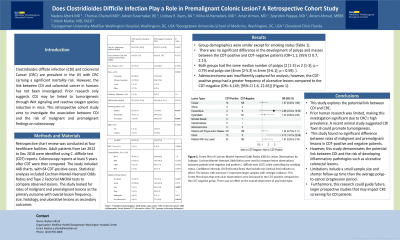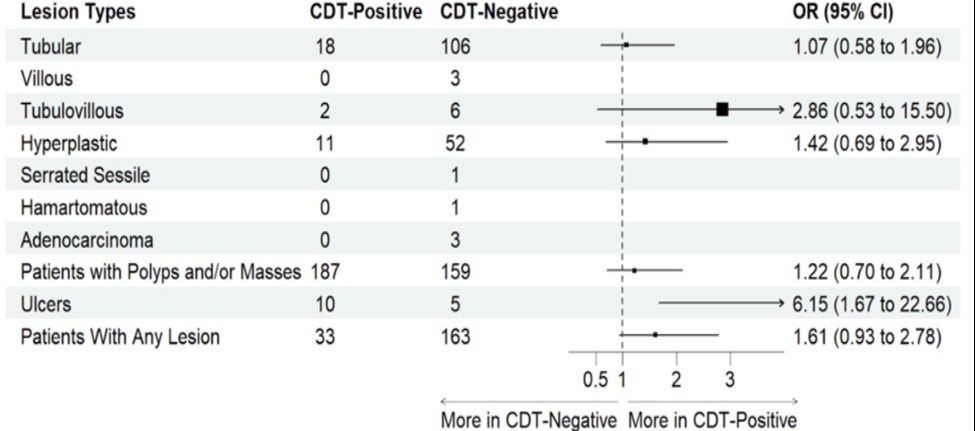Tuesday Poster Session
Category: Colon
P3623 - Does Clostridioides Difficile Infection Play a Role in Premalignant Colonic Lesion? A Retrospective Cohort Study
Tuesday, October 29, 2024
10:30 AM - 4:00 PM ET
Location: Exhibit Hall E

Has Audio

Nadera Altork, MD
MedStar Health-Georgetown/Washington Hospital Center
Washington, DC
Presenting Author(s)
Nadera Altork, MD1, Thomas Chameli, 2, Advait Suvarnakar, BS3, Lindsay R. Ayers, BA2, Mina Al-Hamadani, MD1, Amer Arman, MD1, Spyridon Peppas, MD1, Akram Ahmad, MBBS4, Mark Mattar, MD, FACG3
1MedStar Health-Georgetown/Washington Hospital Center, Washington, DC; 2Georgetown University School of Medicine, Washington, DC; 3MedStar Georgetown University Hospital, Washington, DC; 4Cleveland Clinic Florida, Weston, FL
Introduction: Clostridioides difficile infection (CDI) and Colorectal Cancer (CRC) are prevalent in the US with CRC carrying a significant mortality risk. However, the link between CDI and colorectal cancer in humans has not been investigated. Prior research only suggests CDI may be linked to tumorigenesis through Wnt signaling and reactive oxygen species induction in mice. This retrospective cohort study aims to investigate the association between CDI and the risk of malignant and premalignant findings on colonoscopy
Methods: Retrospective chart review was conducted at four healthcare facilities. Adult patients from Jan 2012 to Dec 2018 were identified using C. difficile test (CDT) reports. Colonoscopy reports at least 5 years after CDT were then compared. The study included 448 charts, with 64 CDT-positive cases. Statistical analyses included Cochran-Mantel-Haenszel Odds Ratios and Type 2 Factorial ANOVA tests to compare observed lesions. The study looked for rates of malignant and premalignant lesions as the primary outcome with overall lesion frequency, size, histology, and ulcerative lesions as secondary outcomes
Results: Group demographics were similar except for smoking status (Table 1). There was no significant difference in the development of polyps and masses between the CDT-positive and CDT-negative patients (OR=1.1; [95% CI 0.7, 2.1]). Both groups had the same median number of polyps (2 [1-3] vs 2 [1-3]; p = 0.79) and polyp size (4mm [2-5.3] vs 4mm [3-6.1]; p = 0.59). ). Adenocarcinoma was insufficiently captured for analysis; however, the CDT-positive group had a greater frequency of ulcerative lesions compared to the CDT-negative (OR= 6.149; [95% CI 1.6, 22.65]) (Figure 1).
Discussion: This study explores the potential link between CDI and CRC. Prior human research was limited, making this investigation significant due to CRC's high prevalence. A recent animal study suggested CDI Toxin B could promote tumorigenesis. This study found no significant difference between rates of malignant and premalignant lesions in CDT-positive and negative patients. However, this study demonstrates the potential link between CDI and the risk of developing inflammatory pathologies such as ulcerative colorectal lesions. Limitations include a small sample size and shorter follow-up time than the average polyp-to-cancer progression period. Furthermore, this research could guide future, larger prospective studies that may impact CRC screening for CDI patients

Note: The table for this abstract can be viewed in the ePoster Gallery section of the ACG 2024 ePoster Site or in The American Journal of Gastroenterology's abstract supplement issue, both of which will be available starting October 27, 2024.
Disclosures:
Nadera Altork, MD1, Thomas Chameli, 2, Advait Suvarnakar, BS3, Lindsay R. Ayers, BA2, Mina Al-Hamadani, MD1, Amer Arman, MD1, Spyridon Peppas, MD1, Akram Ahmad, MBBS4, Mark Mattar, MD, FACG3. P3623 - Does <i>Clostridioides Difficile</i> Infection Play a Role in Premalignant Colonic Lesion? A Retrospective Cohort Study, ACG 2024 Annual Scientific Meeting Abstracts. Philadelphia, PA: American College of Gastroenterology.
1MedStar Health-Georgetown/Washington Hospital Center, Washington, DC; 2Georgetown University School of Medicine, Washington, DC; 3MedStar Georgetown University Hospital, Washington, DC; 4Cleveland Clinic Florida, Weston, FL
Introduction: Clostridioides difficile infection (CDI) and Colorectal Cancer (CRC) are prevalent in the US with CRC carrying a significant mortality risk. However, the link between CDI and colorectal cancer in humans has not been investigated. Prior research only suggests CDI may be linked to tumorigenesis through Wnt signaling and reactive oxygen species induction in mice. This retrospective cohort study aims to investigate the association between CDI and the risk of malignant and premalignant findings on colonoscopy
Methods: Retrospective chart review was conducted at four healthcare facilities. Adult patients from Jan 2012 to Dec 2018 were identified using C. difficile test (CDT) reports. Colonoscopy reports at least 5 years after CDT were then compared. The study included 448 charts, with 64 CDT-positive cases. Statistical analyses included Cochran-Mantel-Haenszel Odds Ratios and Type 2 Factorial ANOVA tests to compare observed lesions. The study looked for rates of malignant and premalignant lesions as the primary outcome with overall lesion frequency, size, histology, and ulcerative lesions as secondary outcomes
Results: Group demographics were similar except for smoking status (Table 1). There was no significant difference in the development of polyps and masses between the CDT-positive and CDT-negative patients (OR=1.1; [95% CI 0.7, 2.1]). Both groups had the same median number of polyps (2 [1-3] vs 2 [1-3]; p = 0.79) and polyp size (4mm [2-5.3] vs 4mm [3-6.1]; p = 0.59). ). Adenocarcinoma was insufficiently captured for analysis; however, the CDT-positive group had a greater frequency of ulcerative lesions compared to the CDT-negative (OR= 6.149; [95% CI 1.6, 22.65]) (Figure 1).
Discussion: This study explores the potential link between CDI and CRC. Prior human research was limited, making this investigation significant due to CRC's high prevalence. A recent animal study suggested CDI Toxin B could promote tumorigenesis. This study found no significant difference between rates of malignant and premalignant lesions in CDT-positive and negative patients. However, this study demonstrates the potential link between CDI and the risk of developing inflammatory pathologies such as ulcerative colorectal lesions. Limitations include a small sample size and shorter follow-up time than the average polyp-to-cancer progression period. Furthermore, this research could guide future, larger prospective studies that may impact CRC screening for CDI patients

Figure: Forest Plot of Cochran-Mantel-Haenszel Odds Ratios (OR) for Lesion Observations by Subtype. Cochran-Mantel-Haenszel Odds Ratios were used to compare lesion observations between patients with negative and positive C. difficile tests (CDT) while controlling for smoking status. Confidence intervals (CI) (horizontal lines) that include one (vertical line) indicate no effect. The lesions with narrower CI represent larger samples with stronger evidence. This Forest Plot shows that only ulcer observations were increased in the CDT-positive compared to the CDT-negative group. There was no effect on the overall observance of any lesion type.
Note: The table for this abstract can be viewed in the ePoster Gallery section of the ACG 2024 ePoster Site or in The American Journal of Gastroenterology's abstract supplement issue, both of which will be available starting October 27, 2024.
Disclosures:
Nadera Altork indicated no relevant financial relationships.
Thomas Chameli indicated no relevant financial relationships.
Advait Suvarnakar indicated no relevant financial relationships.
Lindsay Ayers indicated no relevant financial relationships.
Mina Al-Hamadani indicated no relevant financial relationships.
Amer Arman indicated no relevant financial relationships.
Spyridon Peppas indicated no relevant financial relationships.
Akram Ahmad indicated no relevant financial relationships.
Mark Mattar indicated no relevant financial relationships.
Nadera Altork, MD1, Thomas Chameli, 2, Advait Suvarnakar, BS3, Lindsay R. Ayers, BA2, Mina Al-Hamadani, MD1, Amer Arman, MD1, Spyridon Peppas, MD1, Akram Ahmad, MBBS4, Mark Mattar, MD, FACG3. P3623 - Does <i>Clostridioides Difficile</i> Infection Play a Role in Premalignant Colonic Lesion? A Retrospective Cohort Study, ACG 2024 Annual Scientific Meeting Abstracts. Philadelphia, PA: American College of Gastroenterology.
